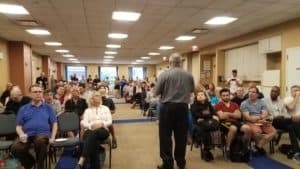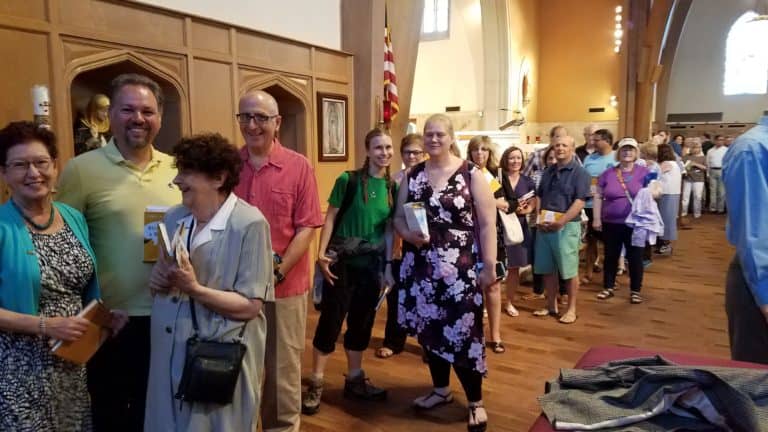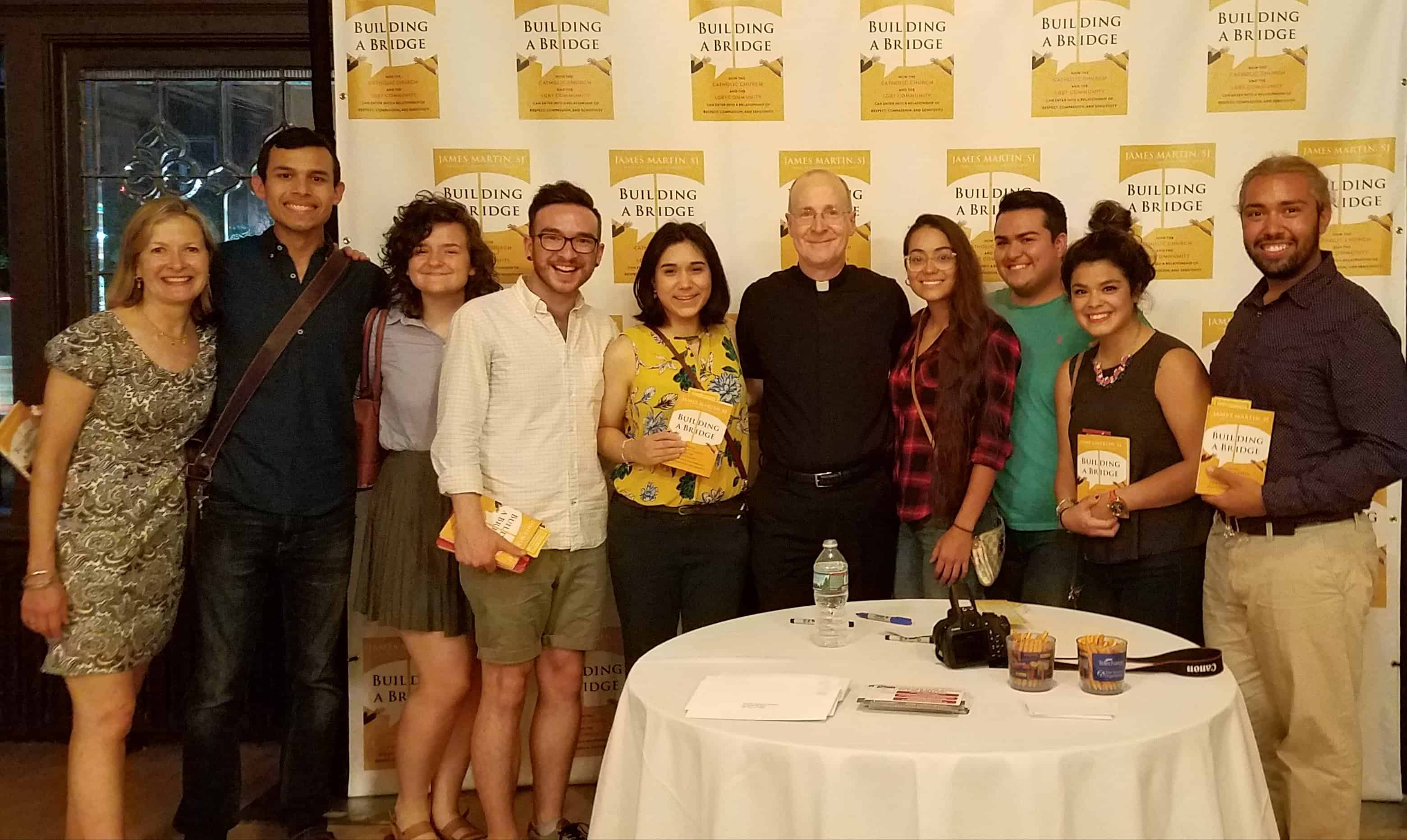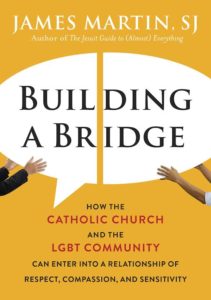Part II in a two-part series. Part I available here.
TJP: In your book Building a Bridge and in many subsequent comments, you note that LGBT Catholics are often singled out in ways that other groups are not, noting, for instance, that people who do not always and everywhere love the poor are not publicly singled out. What are you trying to show with such examples?
Martin: What I’m trying to show is straightforward: that they are often the only group whose sexual morality, or morality in general, is placed under a microscope. For example, we don’t have bishops issuing documents on why someone who is divorced and remarried without an annulment cannot receive a Catholic burial. We don’t have priests thundering from the pulpit about couples living together before marriage. We don’t have Catholic schools firing people who have children out of wedlock. These days it’s mainly LGBT people who are targeted. Why just them? That’s the question. To me, it’s a sign of what the Catechism calls “unjust discrimination,” something we are supposed to avoid.
More basically, if adherence to church teaching is going to be a litmus test for employment in Catholic institutions, then parishes and dioceses need to be consistent. We need to ask people to adhere to all church teachings, not just those that focus on LGBT issues. Those would include Gospel values: caring for the poor, loving one another, forgiving one another. The “weightier matters of the law,” as Jesus would say. When I say this, the response is often that same-sex marriage is a “public scandal.” But I’d suggest that someone working in one of our institutions who is cruel or vindictive is also a scandal. And it is quite public.

Father Gil Martinez, CSP, pastor of the Church of St. Paul the Apostle in New York City, introduces Father James Martin and Xorje Olivares, a member of Out at St. Paul, an LGBT outreach ministry, at a conversation at the parish on Building a Bridge on July 19.
TJP: Within the United States, many identify the promotion of tolerance and respect for LGBT persons with the political (and often secular) Left. How can the US Church make the loving acceptance of LGBT persons a non- or even trans-partisan issue?
Martin: Good question. It’s surprising to me that tolerance is sometimes seen as an issue of the “left.” Because not only do I know a few intolerant people on the left, but Christians on the “right” are also (obviously) committed to the Gospels. Moreover, part of Christian love is respect. What I’m calling for is a meditation on the ways that Jesus approached people who felt that they were on the margins: first, by welcoming them. So the key is, as always, inviting people to meditate on the ways that Jesus approached things. And that is indeed trans-partisan. Jesus transcends those categories.
TJP: Tell us about the Scriptural meditations in your book. What led you to include them?
Martin: For many years I’ve done–like many Jesuits, priests and religious, and lay pastoral workers–a kind of “informal ministry” with LGBT people. And I’ve found that some passages from Scripture have consistently been helpful for LGBT people who are struggling with their faith. Psalm 139 (“I praise you for I am fearfully and wonderfully made”) is one of them. It’s such a powerful tool for people, and helps unlock things for them in prayer.
Likewise, I wanted to include selected passages from the New Testament that I feel can help people gain insight into the ways that Jesus treated people who felt marginalized in his time—like the story of the Roman centurion’s servant, and Jesus’s encounter with Zacchaeus. In the book, I invite readers to use some of the practices of Ignatian contemplation with these passages. What might God want to tell us in our prayer?
And here’s something strange I’ve noticed: almost every reviewer has ignored the entire second half of the book—the Scripture meditations and invitation to prayer. It’s baffled me. When else does someone review only half of a book? And I’m not sure why that is. On the secular left, perhaps they cannot enter into a conversation about spirituality, or they think it’s useless. On the far right, perhaps they cannot admit that these passages might have something new to say to us about LGBT people. When I’m feeling in a darker mood, I wonder if it’s because a few on the far right feel that LGBT people can’t have a spiritual life.
In any event, if you read most reviews, it’s as if I only wrote one half of the book. Very strange. And for me, the second half is by far the more important part. Because the first part is an invitation to dialogue, but the second part is an invitation to prayer.

Parishioners wait in line to meet Father James Martin after a talk at Sacred Heart Church in South Plainfield, NJ, on July 9.
TJP: How do the sacraments figure in this bridge-building?
Immeasurably. And, as I see it, the most essential sacrament in this discussion is baptism, for both groups: LGBT Catholics and church officials.
Often LGBT Catholics are told that they don’t belong in the church. And I remind them of their baptism. I love the line from the Catechism: “Holy Baptism is the basis of the whole Christian life.” It is the “gateway to life in the Spirit,” in another beautiful phrase. Its importance cannot be overestimated. Baptism incorporates us into the Church. So our tradition couldn’t be clearer. It’s important to root LGBT Catholics in the fact that Jesus Christ himself called them into the church.
At the same time, it’s sometimes good to remind those who work in official capacities in the church—clergy and lay alike–that LGBT Catholics are not only full Catholics by virtue of their baptism, but they have essential gifts to bring to the church, as all baptized Catholics do. Jesus called them into the church for their salvation, but also to enrich the church by their presence.
TJP: As we have seen with the disputes over Amoris Laetitia, it is easy in controversies over sexuality to pit love against truth, with the group preaching tolerance holding to “love” and the group preaching orthodoxy holding to “truth.” How do you see yourself holding the two together?
Well, I don’t hold them together; they are held together in Jesus, who is truth and who is love. So there is no real pitting anything against anything else. Our orthodoxy, as well as our orthopraxis, is love, and that is the truth of who we are.
That’s why I continually return to the Gospels. You cannot go wrong following what Jesus did. And yes, I know that the Gospels have to be interpreted, and that people may disagree on those interpretations and applications, but for me some things are clear. For example, Jesus was open to encountering people on the margins, he was open to listening to them, and he always led with welcome.
But overall, all these things are held together in Jesus Christ. And as a Jesuit, everything I do, including the work with this book, is grounded in him. Everything.



